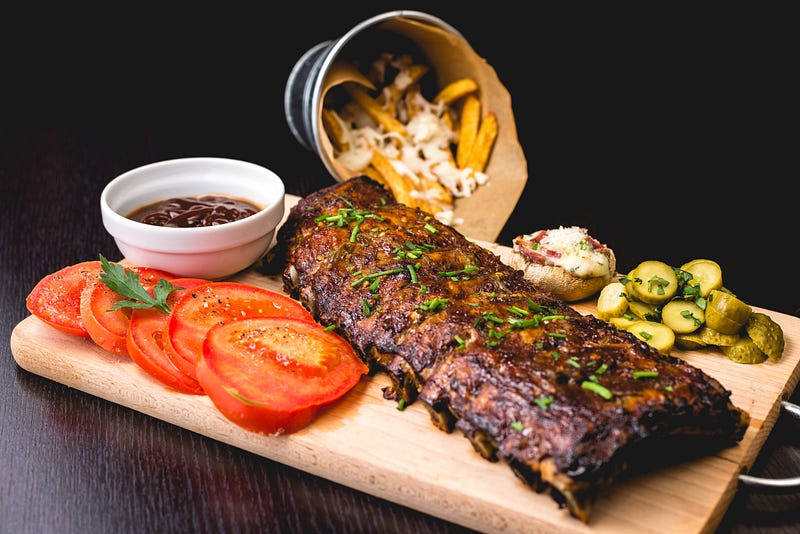Navigating the Vegan Journey: Key Considerations to Keep in Mind
Written on
Chapter 1: Understanding Your Motivation
Making the decision to adopt a vegan lifestyle can be daunting. The complexities and conflicting information surrounding it may lead to hesitation or even abandonment of the idea.

Many prominent athletes and celebrities, such as Venus Williams and Joaquin Phoenix, have embraced veganism, promoting health, ethics, and environmental sustainability. However, the health implications of a vegan diet often provoke contrasting opinions.
The food industry plays a significant role in shaping public perception, as much nutrition research is funded by food corporations, leading to biased findings. This scenario can make seeking advice in vegan forums and online communities overwhelming, with many individuals holding strong, sometimes extreme, views on what constitutes healthy eating.
As a long-time vegetarian and a somewhat imperfect vegan for five years, I encourage you to reflect on three key aspects before fully committing to this change.
Section 1.1: Identify Your Purpose
Changing eating habits is notoriously challenging. Food is tied deeply to survival instincts and emotional well-being. For many, altering diet can evoke feelings of insecurity, particularly for those with a history of food scarcity or disordered eating.
Moreover, food serves as an emotional outlet; we often eat not just for nourishment but also for comfort, social connection, and love. Recognizing your motivations is crucial for a successful transition.
My personal journey towards a plant-based diet began over a decade ago, primarily influenced by my father’s health struggles with cancer. His decision to revamp his diet, supported by research into plant-based nutrition, significantly improved his quality of life.
Numerous studies now affirm the extensive health benefits of a whole food plant-based diet. If you're curious, I recommend exploring "Whole" and "The China Study" by T. Colin Campbell, PhD.
Section 1.2: Consider Animal Welfare
According to the Food and Agriculture Organization, approximately 92 billion land animals are slaughtered annually for food. This staggering figure underscores the ethical implications of our dietary choices.
Additionally, the scale of fish caught for consumption is even larger, potentially reaching up to 2.8 trillion annually. Reflect on your feelings regarding these practices.
Section 1.3: Address Climate Change
Animal agriculture is a major contributor to environmental degradation, including water pollution, deforestation, and greenhouse gas emissions.
Despite the frustration stemming from inadequate government action on climate issues, I firmly believe individual choices matter. Joseph Poore from the University of Oxford emphasizes that adopting a vegan diet may be the most effective way to lessen one’s environmental footprint, surpassing even changes like reducing air travel or switching to electric vehicles.
What They Don't Tell You About Going Vegan - This video delves into the lesser-known aspects of adopting a vegan lifestyle, offering insights and tips for new vegans.
Section 1.4: Assess Your Current Diet
Going vegan doesn't automatically equate to healthier eating habits. If your daily meals are predominantly made up of processed foods, switching to vegan versions won’t necessarily improve your health.
Many processed vegan foods can be less nutritious than their traditional counterparts. The food industry utilizes a plethora of additives that enhance appearance and shelf life rather than nutritional value.
A good starting point is to incorporate more whole, unprocessed foods into your diet, such as vegetables and legumes. If your meals already include a variety of fresh produce, you’re on the right path.
Section 1.5: Shift Your Mindset
When I first transitioned to a plant-based diet, friends often inquired about what I actually ate. This question reflects a common misconception that vegan meals lack variety or substance.
In truth, embracing a whole food plant-based lifestyle unveils a vibrant array of flavors and nutrients. Exploring diverse recipes and culinary traditions has enriched my experience, making traditional meat-centered meals seem dull by comparison.

Focus on the benefits of this lifestyle rather than what you feel you might be sacrificing.
It's important not to set overly ambitious goals. My own transition was gradual—I began by eliminating processed foods, then moved on to reducing meat intake. The more I learned, the more confident I became in my choices.
While I may not be a perfect vegan, I recognize that this journey is about more than just diet; it’s a holistic lifestyle.
Chapter 2: Taking the First Steps
If you feel compelled to initiate change, here are some steps to consider:
- Understand your motivations for wanting to change and the benefits it may bring to you and your surroundings.
- Evaluate your current dietary habits and focus on making informed choices to improve your health.
- Embrace curiosity and flexibility; don’t pressure yourself to achieve perfection immediately. Gradually replacing staples can make the process enjoyable.
The journey towards a vegan lifestyle can be both rewarding and challenging. The choice is yours—make it a fulfilling experience.
5 Things I Wish I'd Known Before Going Vegan - This video shares valuable insights for anyone considering a vegan lifestyle, highlighting common pitfalls and essential tips.
Feel free to reach out for encouragement or advice along the way. I'm here to help!
Disclaimer: My father’s cancer experience is not medical advice, nor is it a recommendation for others to follow.